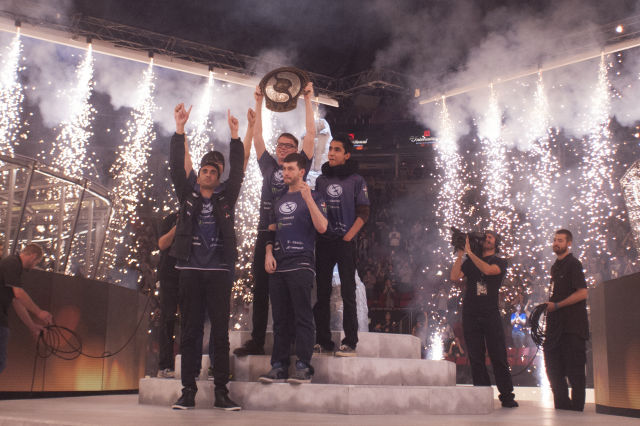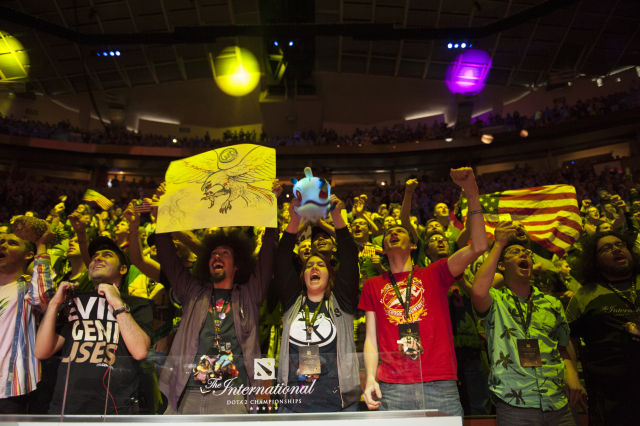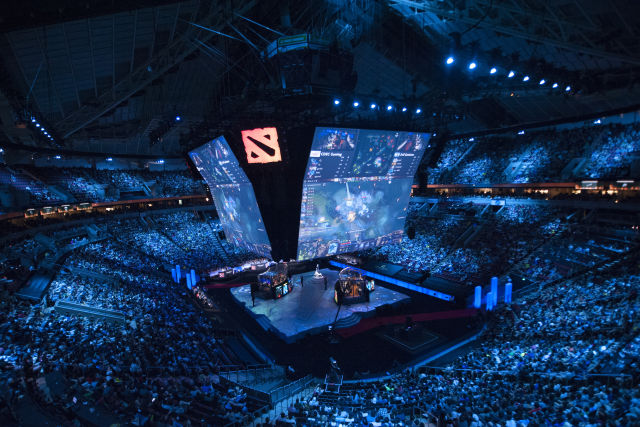
SEATTLE—You know an e-sports event has made it when a crowd’s patriotic chants swell into the tens of thousands. But the bigger surprise at this week’s The International, currently the largest annual Dota 2 gaming tournament, was that those cries weren’t loudest for the usual e-sports titans like Korea or China. This week, capacity crowds celebrated an American squad.
On Wednesday night of The International 2015’s main event, I was squeezed into the giant Key Arena crowd watching EHOME—a Chinese legacy team—duke it out with Evil Geniuses—the only North American squad ever to crack the top three at this Dota 2 championship. I was surrounded by streamers, team community managers, members of the press, and a few rowdy friends. A Chinese Dota 2 reporter sat beside me, cheering on each EHOME play with heavily accented English expletives.
EHOME slotted snugly into the middle of the packed and stacked Chinese squads (including popular teams like LGD) who had torn through The International’s bracket, and the team’s every kill, escape, and feint prompted chants of “EHOME! EHOME!” from the Asian attendees, including my potty-mouthed neighbor. China has dominated the game’s competitive scene year after year, and that streak largely continued at this year’s International. Chinese teams occupied two-thirds of the top six placing teams (each of which claimed more than a million dollars from the tournament’s $18 million prize pool).
Before the best-of-three series closed, the American fans had matched their opposition’s onlookers chant-for-chant throughout the games, but when Evil Geniuses actually won, calls of “USA! USA!” drowned out everything else. At that moment, I exchanged a look with the Asian reporter to my left, who smiled and bashfully put his head in his hands before looking back my way, pumping his fist ever-so-slightly, and softly chanting “USA” just loud enough for the two of us to hear.
Taking the win
The scene at the packed-to-the-gills Key Arena was spectacular for six straight days, even Internet outages couldn’t stop the otherwise high-polish proceedings. Every day, Dota 2 fans got to watch roughly 10 matches a day, as e-sports teams from around the world played five-on-five matches and burned through a complicated two-bracket elimination system. Millions of dollars were at stake, including a $6.6 million grand prize.
This was no mild, tiptoe-into-Dota-water event, either; attendees were expected to know their Dota 2, and the tourney’s slew of commentators spoke rapidly about the game’s various characters and pro-con breakdowns like seasoned sports-radio hosts. The event was a total show of e-sports confidence, making every victory, and every nation-versus-nation face-off, feel that much more like a big deal.
I didn’t fully understand it at the time, but Evil Geniuses weren’t supposed to go this far. Previously, they had taken North America to the precipice of the grand finals in the largest e-sports tournament in the world (at least in monetary terms) twice. It seemed that once more, America would achieve its little victory—not to mention a $2.2 million prize for third place—and quietly disappear, as usual, in the presence of China and Europe.
Instead, winning is for organizations like the aforementioned LGD, or the Legion of Doom-like super-squad Team Secret. Their roster was built from former European champions and talent sniped from Evil Geniuses itself earlier this year, with the obvious goal of winning The International 2015.
Many of Western Dota 2 fandom’s anglocentric hopes and dreams rode with Team Secret. And twenty-four hours before the finals, Secret straddled that wave of adulation straight into Seattle’s KeyArena for their first best-of-three series against EHOME.
At the head of the current was Arteezy, the highest profile member of Evil Geniuses to be absorbed into Secret’s ranks and a mascot for the latter’s egocentric reputation. He wore the gaudy, golden sunglasses that had been passed out for free somewhere in the stadium and a smirk.
What happened next was so perfectly obvious it seemed impossible. Team Secret lost—badly. Their strategies and drafts were straightforward, aggressive, and otherwise predictable—so much so that they may as well have taken a white glove and slapped it across their opponent’s face. The crowd wasn’t scandalized as much as stunned into disbelief. Team Secret exited in defeat with Arteezy’s Nay Bans nowhere to be seen.
While surprising, Team Secret’s loss to EHOME was nothing compared to the shock when they were eliminated, exiled to share 7th and 8th position by Virtus Pro. Virtus Pro was a middle-of-the-pack contender that, by all indications, should have all but rolled over and died (and they did, one stage later, to LGD Gaming). But short of the grand finale, they may have scored the tournament’s most unbelievable result.
Changing lanes
So arrogance overcame the one Western team that was “supposed” to have a shot at winning. But on paper, there was still Evil Geniuses, despite all the discussion about the Americans being one of the strongest teams in the tournament being hard to swallow. Meanwhile, a little team called CDEC Gaming—the “Chinese Dota Elite Community,” which had only just barely qualified for The International—was refusing to lose even a single game to more established teams.
To understand Evil Geniuses’ trajectory at this point, you have to understand what every fan of professional Dota 2 from the United States or Canada learns rather quickly: North America is a joke. The region’s reputation is so bad that “NA Dota” is a literal punch line—a shorthand meme for the comic relief the region’s teams provide as they form and dissolve in the blink of an eye or produce players with the same cavalier attitude as Arteezy without the skill to back it up.
Evil Geniuses are an outlier. The image they project is one of teammates who genuinely like and respect each other. This is the team that makes music videos about how much they love each other using blow-up dolls and Disney songs. This is the team whose captain, after going further than any other North American in history while one of his star players was out with an injury, wrote several hundred words on how it was his fault they didn’t win.
For someone who’s followed the departure of Evil Genius Arteezy, and his subsequent replacement with a 16-year-old wunderkind who rode his bike to an Internet cafe in order to play, the team represents a lot more than mere nationalism. Evil Geniuses is a better class of Dota 2 team that rises above the immature and often appalling behavior e-sports can engender (at least most of the time).
So it was crushing when they made it to that third-place precipice only to be knocked into the elimination bracket at the last minute by the still undefeated CDEC. This Chinese team had started as underdogs but suddenly looked like a pack of dobermans: sleek, impeccably trained, and with their jaws adamantly clamped around first place.
On the final day of The International 2015, LGD Gaming and Evil Geniuses would play for the mere opportunity to face the seemingly unstoppable squad. The loser would walk away with $2.2 million. The winner received at least an extra $600,000 and the dubious proposition of playing up to eight games in a row for the $6.6 million grand prize.
Luckily for Evil Geniuses, they eliminated LGD Gaming in just two admittedly arduous rounds. “USA!” resounded again, as well as “EG! EG!”
A happier ending
The final match was a total dissection of CDEC’s uncompromising strategies. Fear, Evil Geniuses’ 28-year-old “senior” member (called “Old Man Fear” by the community), backed up Sumail, the 16-year-old prodigy, and his boundless aggression played out like an older brother standing behind a hyperactive sibling. Universe, famous for his level-headedness, dove and disrupted CDEC’s rigid frontline, while Aui_2000 was the string that held them all together—disabling or dealing extra death to the Chinese players where necessary. PPD, the EG team captain, had the faith and understanding of his teammates to draft them exactly the heroes they needed. It was like watching an interpretive dance, telling the story of each player’s personality through steampunk helicopters and $6 million slam dunks.
Each of these players has a “real” name to go with their handle, but these are the monikers that those in attendance shouted and tweeted about as the five players hoisted the Aegis of Champions—an ornate metal shield which acts as the championship trophy. At three wins to one, they had become the first North American players to win the finals mere minutes after becoming the first such team to even play in the final match.
Confetti matching this year’s gold color scheme doused the stands, while indoor fireworks somehow didn’t light the stage’s expensive soundproof-booth and super-sized screen rigs on fire. The players’ concussed words of appreciation barely had time to sink in before Deadmau5 appeared as a closing-ceremony musical act and proceeded to do his thing.
I wasn’t going to hear another coherent chant from this crowd, amidst the EDM, fire hazards, and guttural excitement at witnessing e-sports history, but that was fine. To see Evil Geniuses win one for the Gipper was exciting, but more importantly the story of Evil Geniuses, which has developed in parts over years, finally culminated in a groundbreaking victory.
It was the kind of sports story, full of mentorship, good attitudes, and hard work, that mainstream American sports have severely lacked for some time. I’d call those qualities enough to count e-sports as “legitimate.”





